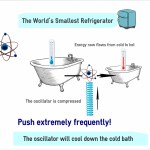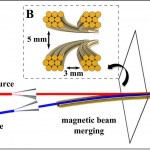absolute zero
A recent paper by Weizmann Institute scientists suggests that we might be able to break the third law of thermodynamics. This is how that law was originally formulated in 1908 by Walther Nernst: “It is impossible for any procedure to lead to the isotherm T = 0 in a finite number of steps,” (source: Wikipedia). To elaborate, the entropy of a system approaches nil as the temperature closes in on absolute zero, so that extracting further energy becomes increasingly difficult. According to the third law, you can get very close – temperatures of less than a billionth of a degree have already been…
Today’s post is about some cool chemistry – very cool. About 0.01°Kelvin, as a matter of fact (that is, one hundredth of a degree above absolute zero). Physics experiments conducted at such temperatures are already old hat, but chemistry is another story, altogether. Scientists have been attempting to produce chemical reactions at ultra-low temperatures for at least 50 years; a Weizmann research team has finally achieved that goal.
Why try to get reactions to take place in these conditions, which are wholly unfavorable to the usual lab-type chemistry? The answer is that when temperatures drop…

